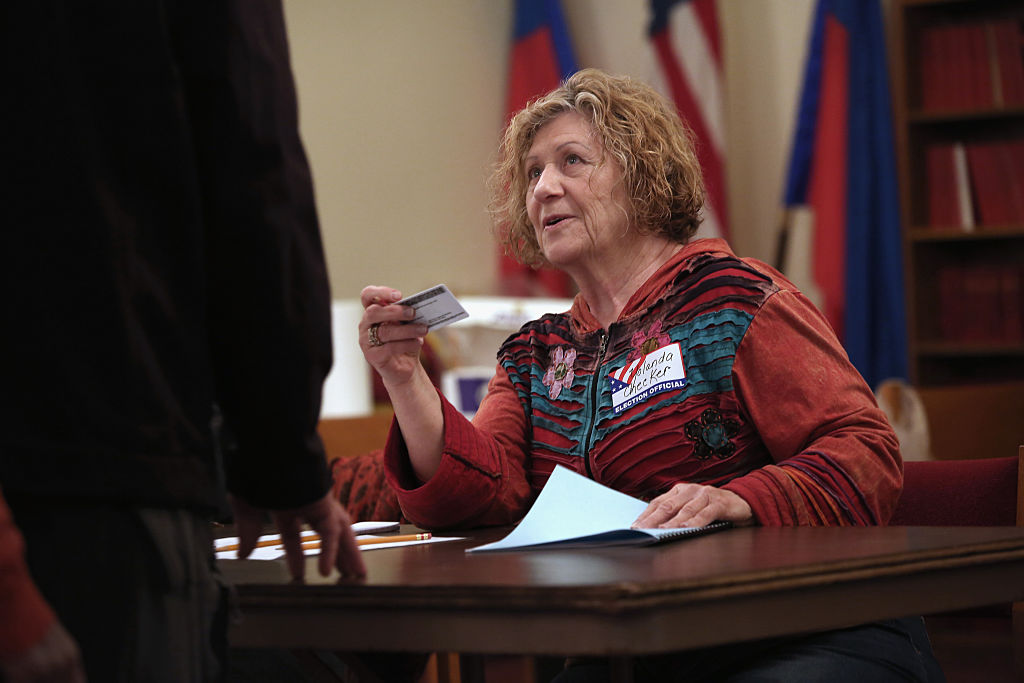Texas softens strict voter ID law to comply with federal court ruling


A free daily email with the biggest news stories of the day – and the best features from TheWeek.com
You are now subscribed
Your newsletter sign-up was successful
In July, the U.S. 5th Circuit Court of Appeals ruled that Texas' strict voter ID law has a "discriminatory effect" that violates the U.S. Voting Rights Act, potentially disenfranchising more than 600,000 registered voters, most of them poor or minorities. On Wednesday, Texas announced a compromise worked out with the U.S. Justice Department and minority rights groups that had filed suit over the 2011 law.
Under the agreement, which requires approval from U.S. District Judge Nelva Gonzales Ramos, registered voters without one of the seven sanctioned forms of photo ID will be allowed to vote in November after signing an affidavit affirming that they are U.S. citizens and producing an alternate form of proof of ID, such as a paycheck or utility bill. Texas will also have to spend $2.5 million to publicize the new rules. The state has already spent $3.5 million defending the 2011 voter ID law.
Chad Dunn, a Houston lawyer working for the minorities rights groups, called the compromise "a critical leap forward," while a spokesman for Texas Attorney General Ken Paxton said "this case isn't over." Texas will revisit the law after November, possibly taking its case all the way to the Supreme Court, Paxton signaled. The 5th Circuit Court of Appeals, among the most conservative appellate courts, also ordered the lower court to consider whether Texas intended to discriminate against minorities, a steeper finding that could put Texas back on a list of states that need prior federal approval to change electoral laws.
The Week
Escape your echo chamber. Get the facts behind the news, plus analysis from multiple perspectives.

Sign up for The Week's Free Newsletters
From our morning news briefing to a weekly Good News Newsletter, get the best of The Week delivered directly to your inbox.
From our morning news briefing to a weekly Good News Newsletter, get the best of The Week delivered directly to your inbox.
A free daily email with the biggest news stories of the day – and the best features from TheWeek.com
Peter has worked as a news and culture writer and editor at The Week since the site's launch in 2008. He covers politics, world affairs, religion and cultural currents. His journalism career began as a copy editor at a financial newswire and has included editorial positions at The New York Times Magazine, Facts on File, and Oregon State University.
-
 How the FCC’s ‘equal time’ rule works
How the FCC’s ‘equal time’ rule worksIn the Spotlight The law is at the heart of the Colbert-CBS conflict
-
 What is the endgame in the DHS shutdown?
What is the endgame in the DHS shutdown?Today’s Big Question Democrats want to rein in ICE’s immigration crackdown
-
 ‘Poor time management isn’t just an inconvenience’
‘Poor time management isn’t just an inconvenience’Instant Opinion Opinion, comment and editorials of the day
-
 ABC News to pay $15M in Trump defamation suit
ABC News to pay $15M in Trump defamation suitSpeed Read The lawsuit stemmed from George Stephanopoulos' on-air assertion that Trump was found liable for raping writer E. Jean Carroll
-
 Judge blocks Louisiana 10 Commandments law
Judge blocks Louisiana 10 Commandments lawSpeed Read U.S. District Judge John deGravelles ruled that a law ordering schools to display the Ten Commandments in classrooms was unconstitutional
-
 ATF finalizes rule to close 'gun show loophole'
ATF finalizes rule to close 'gun show loophole'Speed Read Biden moves to expand background checks for gun buyers
-
 Hong Kong passes tough new security law
Hong Kong passes tough new security lawSpeed Read It will allow the government to further suppress all forms of dissent
-
 France enshrines abortion rights in constitution
France enshrines abortion rights in constitutionspeed read It became the first country to make abortion a constitutional right
-
 Texas executes man despite contested evidence
Texas executes man despite contested evidenceSpeed Read Texas rejected calls for a rehearing of Ivan Cantu's case amid recanted testimony and allegations of suppressed exculpatory evidence
-
 Supreme Court wary of state social media regulations
Supreme Court wary of state social media regulationsSpeed Read A majority of justices appeared skeptical that Texas and Florida were lawfully protecting the free speech rights of users
-
 Greece legalizes same-sex marriage
Greece legalizes same-sex marriageSpeed Read Greece becomes the first Orthodox Christian country to enshrine marriage equality in law
